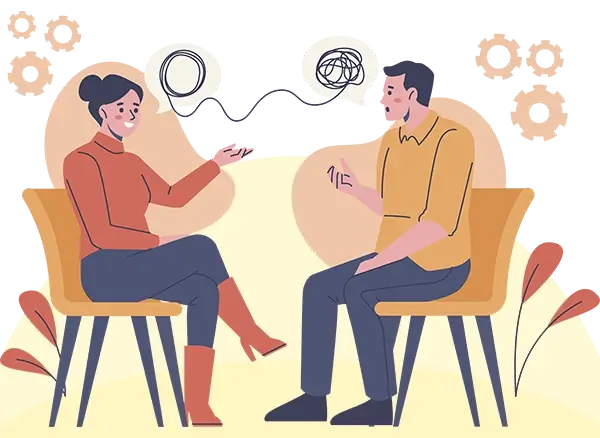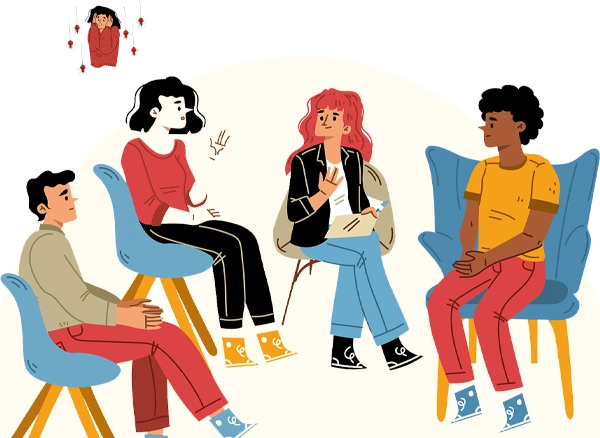Learn whether you may be living with Anxiety with this expert-reviewed test. After receiving your results, you’ll have the opportunity to learn more about your symptoms and talk to a licensed therapist.
Begin TestThis mental health assessment is not a diagnosis or a substitute for licensed therapy. You can schedule with a qualified mental health professional here.
Do you constantly feel anxious or excessively worry over everyday things? If so, this test may be helpful for you. This is a fast and free assessment that helps you understand how often you experience some of the symptoms associated with Generalized Anxiety Disorder (GAD). This test is not a substitute for an official diagnosis or mental health support. These ten questions represent common anxiety symptoms associated with GAD. This test will use your answers about the frequency of your anxiety symptoms to generate a score out of 28 points that will provide you with more insight into how often you feel anxious. This tool is not meant to act alone to provide an anxiety diagnosis; instead, it is meant to provide clarity on the frequency of anxiety symptoms and help you understand whether seeing a therapist near you may help.
Begin Test
GAD is characterized by persistent feelings of worry or anxiety that are difficult to control. Anxiety disorders can cause physical symptoms such as inability to sleep, stomach aches, headaches, and inability to focus. Along with those effects, having difficulty breathing or a feeling like your heart is racing are also common anxiety symptoms.
There are various factors that may contribute to the development of Generalized Anxiety Disorder. Some of these factors include having a family history of anxiety, living or working in a stressful environment, and biological factors. The brain structures and chemicals may play a role in contributing to anxiety symptoms.
Cognitive Behavioral Therapy (CBT) can be an effective form of anxiety treatment. In CBT, a therapist works with an individual to identify any thoughts or behavioral patterns associated with the anxiety. The individual can then work on correcting those behaviors and developing coping strategies to manage anxiety symptoms when they manifest. In some cases, a psychiatrist may prescribe anti-anxiety medication in addition to the counseling sessions.
If you feel as though you deal with anxiety symptoms or might have GAD, it’s worth it to talk to a mental health professional. One 10-question test cannot fully encompass the variety of anxiety symptoms associated with GAD. You may have experiences outside of these questions that were not measured. This test is meant to be a tool and to provide some insight. If you did not score highly but still think you have GAD or a different mental health disorder, talking to a therapist can be beneficial.
Generalized Anxiety Disorder is more common than people think. A study shows that 5.7 percent of US adults experience GAD symptoms at some point in their lives. You are not alone. A therapist near you can help you manage anxiety symptoms and meet your needs with a unique treatment plan. Once you have found a therapist who is the right fit for you, the next step is to choose between in-person and online therapy. With virtual therapy, you can receive GAD treatment from the comfort of your home. Our online therapists provide support with managing anxiety symptoms and improving your overall mental health.
Find a Therapist

The 3-3-3 rule is a simple grounding technique that helps manage anxiety and redirect your focus to the present. When you feel anxious, look around and name three things you see, three things you hear, and move three parts of your body, like your fingers, shoulders, or toes. This exercise helps interrupt anxious thoughts and calms your mind by reconnecting you with your surroundings.
Common signs of anxiety can vary from person to person, but five common symptoms include:
Excessive worry that is hard to control or seems too much for the situation.
Restlessness or feeling on edge, making it hard to relax.
Fatigue, even after getting enough rest.
Difficulty concentrating or feeling like your mind goes blank.
Physical symptoms like a rapid heartbeat, sweating, shaking, or shortness of breath.
Severe anxiety often requires a combination of methods for the best results. Some effective treatments include:
Anxiety Therapy: Cognitive Behavioral Therapy (CBT), which helps identify and change unhelpful thought patterns, and Mindfulness-Based Therapy are both effective means of treating anxiety.
Anti-Anxiety Medication: Meds can be helpful to people with severe anxiety. See this list of good anti-anxiety medications.
Lifestyle changes: Regular exercise, consistent sleep, and a balanced diet are all important parts of a healthy, holistic anxiety treatment plan.
Relaxation techniques: Such as deep breathing, mindfulness, or progressive muscle relaxation.
Support systems: This can include friends, family, or support groups. Lean on them for understanding and encouragement.